Office Management and Secretaryship - Office Form Sets | 11th Office Management and Secretaryship : Chapter 4 : Office Stationeries and Forms
Chapter: 11th Office Management and Secretaryship : Chapter 4 : Office Stationeries and Forms
Office Form Sets
Form
Sets:
It
is convenient to use sets of form to prepare more than one copy of a document.
In this way, multiple copies can be made by a single writing method. The sets
of forms can be constructed in the following ways:
1.
Loose
sheets put into sets
2.
ingle
sheet perforated and folded
3.
Sets
in gangs method
4.
Sets
in books or pads
5.
Unit
sets and
6.
Continuous
sets or continuous stationery
1. Loose Sheets Put
into Sets Method: Under this method the office typist or clerk assembles the forms
and carbon paper into place before typing or writing. The method is simple and
hence used quite commonly. It has certain drawbacks
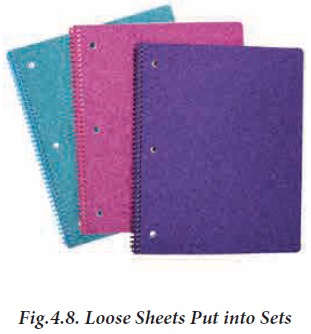
·
It
requires the operator to do preparatory work before forms set is put together.
·
If
the carbon papers are not used with care, copies may be illegible.
2. Single Sheet
Perforated and Folded Method: Duplicate or triplicate form sets can be made by folding perforating or scoring single sheet of
paper.
3. Sets in Gang
Method: The
term ‘gang’ means that a group of
two or more identical forms are printed on a single sheet and are separated by
perforations. These gang sheets may be in loose form but are often bound into
pads or assembled and glued into unit sets. All the sheets may be assembled and
perforated into gangs, or the record copies may not perforated and may be used
as a register.
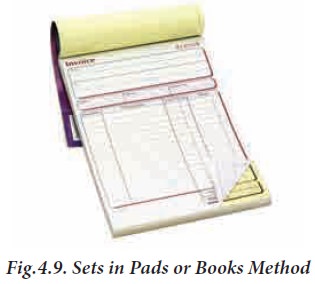
4. Sets in Pads or Books Method: Quit often forms of the
same type or different forms comprising a set are padded in such a way that all
the copies are perfectly aligned.
5. Unit Sets: Under this method
variable lengths and breadths of the respective sheets in
the set are used. This method of form set construction is economical where the
quantity used is small and continuous forms happen to be costly. Unit sets can
be constructed in two ways: (a) Unit blocked sets (b) Snap sets method.
6. Continuous Sets or
Continuous Stationery: The time taken by the typist for putting the forms on
the typewriter is long. To eliminate this, continuous stationery is used.
Several copies are obtained by the use of copying methods without going through
the process of tearing off forms and inserting carbon paper. It may be defined
as a device whereby office forms are produced in a continuous strip and
separate forms are divided from one another by perforations.
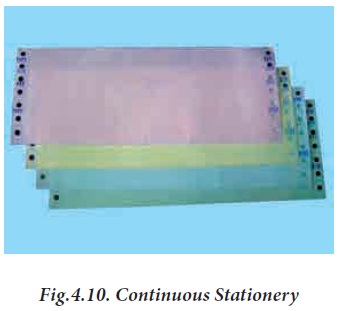
Different Types of Continuous Stationery: There are three basic
types of continuous stationery which can be adopted when forms are designed and
produced. They are:
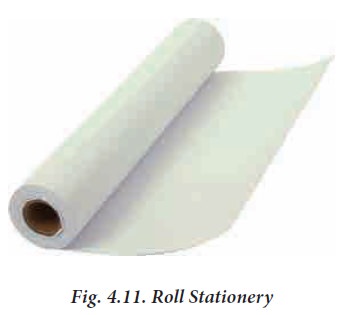
i. Roll Stationery: In this type, the form is continuous roll. There are no perforations and the torn
against a metal cutting edge when message have roll is inter-leaved with a
single carbon paper used in tele printers, telex etc.,
ii. Interfold
Stationery: In this type of stationery perforated
and the stationery is inter-leaved and form fashion. This is also called as
“Flat”.
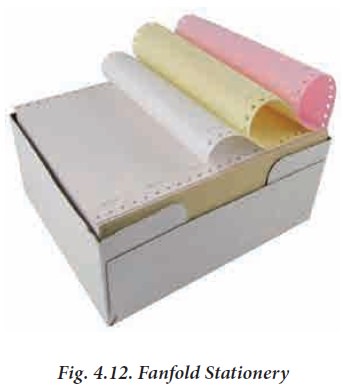
Uses of Continuous Stationery:
Continuous
stationery is also used in all types of book keeping, accounting machines and
also in punched card tabulation. It is also used the print out of work
processing machines and computer. It is also used in Desk sized manifold
register, Portable sized Mani folder, Auto graphic Register.
Advantages of Continuous Stationery:
(i)
It saves the time of the typist by avoiding boring and difficult task of assembling
various forms to construct a form set.
(ii)
It facilitates the speedy use of all machines.
(iii)
It brings about efficiency in office operations because of considerable savings
in time by eliminating various operations.
Disadvantages of Continuous Stationery:
i.
Making
alterations or corrections is difficult.
ii.
Forms
are soiled by the pressure of the typing machine roller on the carbon papers.
iii.
Bottom
copies are faint and unreadable.
iv.
Where
several forms are interleaved with carbon papers they tend to get out of
alignment and in certain forms like invoices, figures may be typed in wrong
places.
Related Topics